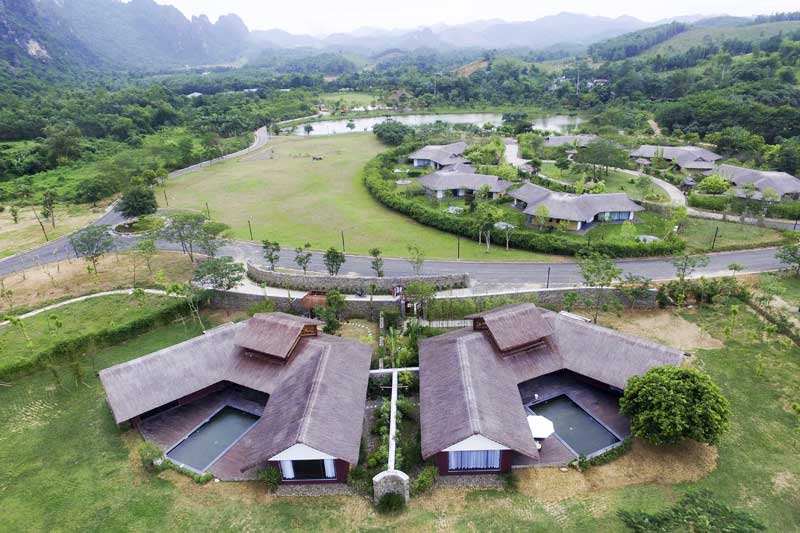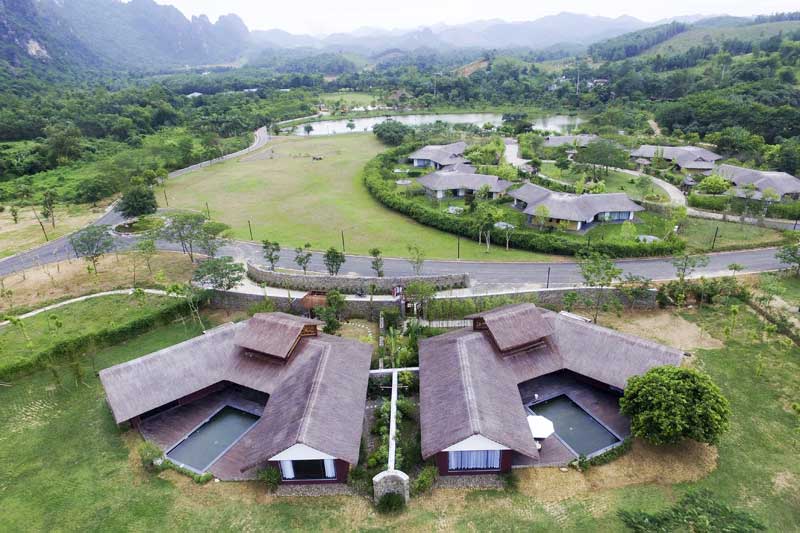
(HBO) – Kim Boi district in northern Hoa Binh province is endowed with beautiful natural scenery with majestic caves, mountains and forests. It is also famous for folk culture and traditional festivals of Muong ethnic minority group. To promote its potential, the district has focused investment on improving the quality of tourism services, striving to become a high-quality tourism centre in the province.

Serena Resort in Khai Doi hamlet, Sao Bay commune, is one of
the high-class resorts in Kim Boi district.
Kim Boi has long been known for its hot mineral
spring. The spring is considered one of the best natural mineral
hot springs in
Southeast Asia.
Additionally, Kim Boi is a famous land of folk culture and traditional
festivals of the Muong ethnic minority people. Archaeological relic site of
Dong Thech ancient tomb (Chieng hamlet, Vinh Dong commune) dating back to the
second half of the 17th century with small and big stone columns carved in Han
– Nom scripts was recognised as a national relic site. Annually, a number of
festivals are held across the district such as Muong Dong festival (to pray for
good crops and happy families), spring festival, Khuong mua (xuong dong or
taking to the paddy fields), and a festival celebrating a new rice crop. Folk
community games are held at village festivals such as ‘nem con’ (cloth balls
throwing), ‘keo co’ (tug of war), and ‘day gay’ (stick pushing) along with
unique dances.
Furthermore, Kim Boi boasts a diverse system of
caves, mountains and old forests. These natural advantages enable the district
to develop eco-tourism, resort tourism and tours to explore Muong ethnic
culture. The district is home to many eco-tourism sites such as Serena Resort (
Sao
Baycommune), Cuu Thac Tu Son (site of nine waterfalls in Tu Son commune), Mat Troi
(Sun waterfall in Kim Tien commune), Thuong Tien specialised forest and
V’Resort (Vinh Tien commune).
The
number of visitors to Kim Boi district is higher than those to the districts of
Ky Son, Yen Thuy, Luong Son, Lac Son, Tan Lac and Cao Phong. However, the
figure is lower than those of Hoa Binh city, and Mai Chau and Lac Thuy districts.
Kim Boi district ranked third in the province in terms of revenues from tourism
services last year with 137.6 billion VND (6 million USD), just behind Luong
Son and Lac Thuy districts. Last year, the district’s tourism sector saw
promising signals. By the end of November, Kim Boi welcomed nearly 197,000
tourists, including 18,771 domestic visitors and 8,124 foreigners. Hotel room
occupancy reached 65 percent.
The district is planning to develop high-quality tourism to attract more
domestic and international foreigners. High-end resorts will be developed in
parallel with top quality tours and community-based tourism. It expects to welcome
250,000 visitors by 2020, 400,000 by 2025 and 650,000 by 2030. Earnings from
tourism are expected at 250 billion VND by 2020, 460 billion VND by 2025 and
900 billion VND by 2030./.
A diverse chain of eco-tourism and resort destinations concentrated in Hoa Binh city and the districts of Tan Lac, Da Bac, and Luong Son… Along with the launch of several key high-quality resort tourism projects, these developments have reshaped the landscape and enhanced the appeal of Hoa Binh as a travel destination.
Boasting diverse terrain, a mild climate, and rich natural resources, Cao Phong district is increasingly asserting its place on Vietnam’s tourism map, attracting both domestic and foreign visitors. The district is renowned for its stunning landscapes, majestic mountains, a crystal-clear hydropower lake, and the unique cultural identity of local ethnic groups.
With its pristine landscapes, unique cultural heritage of Muong ethnic minority, and an expanding range of visitor experiences, Tan Lac district of Hoa Binh has fast become a captivating destination for both domestic and international tourists.
Until now, Sung village in Cao Son commune, Da Bac district remains the only Dao ethnic community in Hoa Binh province to develop a community-based tourism model. Beyond its untouched natural landscapes, cultural identity serves as the cornerstone attraction for visitors.
Alongside the diverse cultural identities of the Kinh, Muong, Tay, Thai, Dao, and Mong ethnic people, Hoa Binh province is also renowned as the "capital" of the northwestern Vietnamese cuisine, offering unique and distinctive dishes. At festivals, during Lunar New Year (Tet), or on significant family or community occasions, special dishes are prepared, leaving a lasting impression on visitors.
A Phong Linh (Yellow Tabebuia) flower garden in Thang village, Thach Yen commune, Cao Phong district is currently in full bloom, drawing a large number of visitors.



